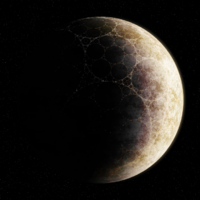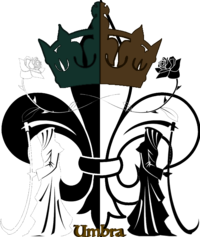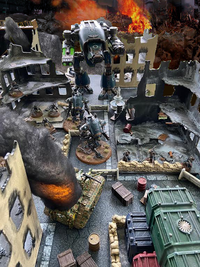Umbra Major
| Umbra Major | |
|---|---|
 Umbra Major | |
|
Segmentum: |
Ultima Segmentum |
|
Sector: |
|
|
Subsector: |
|
|
System: |
|
|
Class: |
Forge World |
|
Type: |
Minor |
Population
Government: Dark Mechanicum “Kingdom”; Dominion of Adrasteia I, Archmagos Regina Umbra Major, Fabricatrix General, Lady of Corpses, Heretek Necrocrafter Primus, The Barrow Queen, Creator of the Unlife Algorithm.
Tithe Grade: Non Oboediens
Armed forces: Legio Revenantus Titan legion (at least six maniples on home station), Umbral Knight houses, The Risen (Skitarii and Secutarii), The Necromata (Revenant Adsecularis corpse-thralls reanimated via the Unlife Algorithm), weaponized Adepts and servitors, Umbral Air Corps (36 squadrons on home station), Umbral Navy 1st fleet.
Terrain (typical): Hive/Manufactorum, Fortress, Spaceport, Waste
Notable Locations: Umbra Forge, Umbra Hive, Necropolis Hive, The Barrows, The Charnel Foundries, The Death Forge, Umbra Major Orbital Docks & Fleet HQ, Umbral Air Corps HQ, Castrum Stativa Revenantus.
Description
Umbra Major is a Forge World that has only recently been rediscovered by the Imperium. Originally founded during the first expansions of Mars, the forge spent many long millennia in isolation during the Age of Strife. Isolation bred self-reliance and, dangerously, independence. Eventually the Forge Fathers of Mars were forgotten, their prerogatives declared irrelevant, and knowledge of their very existence relegated to ancient data stacks archived in deep-sequestered storage. Unrestricted by the Rule of Mars, the Magi of Umbra Major began to explore and utilize forbidden technology, Xeno-tech and Warp-tech, that would surely make them heretics in the eyes of their Mechanicum brethren. Some of their more macabre creations include Spectral Lanthorns (which exploit the souls of peasants trapped within to fuel many of the Forge’s other horrifying devices), Ghostforges, and Necro-tech horrors. Most infamous of all are the Umbral Caskets which run the Unlife Algorithm: The fell geno-empyrian bioprogram that allows the Necrofabricators to reanimate dead flesh and bone.
Umbra Major quickly expanded its influence through the local co-moving star systems, eventually colonizing and feudalizing over a dozen worlds within the Umbral binary and the nearby Cerulean Shoals. The primary agents of this expansion were the Titans of Umbra Major’s own Legio Revenantus. Most of these planets were uninhabited, but a few hosted minor civilizations of techno-barbarians. These shredded remnants of lost colonies from the Dark Age of Technology were quickly awed and pacified by the god-engines of Revenantus. The primitive cultures adapted well to the feudal structure set up by the Magos Rex of Umbra and now serve as vassal worlds providing Knight lances and Skitarii “volunteers” for the defense of the Umbral Stars.
The current Fabricator General and Queen of Umbra Major is HRH Adrasteia I, who has ruled the Umbral Stars for the last two thousand years with the iron grip of the dead. Using her most abhorrent creation, the Unlife Algorithm, she has twisted her domain into the haunted kingdom it is today. It is she who created the Risen, the Necromata, and who turned the engines of Legio Revenantus into walking scions of undeath.
Towering forge-mottes dominate the smoggy skyline of Umbra Major. Bailey hives spread haphazardly out at the feet of these factory-fortresses, providing meagre living accommodation for billions of forge-born peasants, tech menials, and indentured guild artisans. The lower orders of Umbral noble society, the so-called magos gentry, organize and manage the peasant workforce.
Situated on a ridge of black rock between the Charnel Foundries and Dark Hollow Spires is the massive and imposing Castrum Stativa Revenantus. This mighty fortress is the headquarters of Legio Revenantus. High, slab-sided ceramite walls and crenellated towers topped with anti-air and anti-orbital defense batteries look down upon massive engine shops, assembly yards, supply warehouses, and landing fields. The main gates are forged from solid Adamantine and are guarded round the clock by a hand-picked force of vassal Knights. From here, Legio Revenantus sends maniples of Titans into the stars to further the goals of Umbra.
Between the forges, the landscape of Umbra Major is inhospitable. The surface is covered in sprawling scrap yards, cratered pit mines, and macabre mass graves through which the necro-fabricators sift for recyclable mechanical and biological materials. Through these terrible wastelands rove outlaw scavengers and hunting necro-tech horrors. Polluted sea cisterns, covered in green algae, make each forge-fief an island fortress unto itself. Hidden macro-fauna cause disturbing ripples in the slimy water and make travel across or under the surface of the seas hazardous in the extreme. Though the forge-mottes are geographically isolated all owe allegiance to Umbra Forge, the royal seat of Adrasteia I.
Moons
Umbra Major has two natural satellites, Umbra Minor and Umbra Tertius.
Umbra Minor
Classification: Mining World
Government: Dark Mechanicum administration
Tithe Grade: Non Oboediens
Armed forces: Risen Skitarii garrison and Necromata contingent, weaponized Adepts and servitors.
Terrain (typical): Wastes, Rugged (mining infrastructure)
Notable Locations: Alpha Station, The Pit, Mines of Shadow
Umbra Minor is the larger of two moons orbiting Umbra Major. Atmospheric processors allow the moon to maintain a tenuous atmosphere, just enough to allow the Techno-serfs and Forge-born villains to breath as they toil endlessly in strip mines and ore refineries. Even death is no respite, as most are reanimated with Umbral Caskets and sent back to work the ore seams next to the living they once called friends.
Umbra Tertius
Classification: Dead World
Population: 350 permanent, approx. 1500 temporary at any given time
Government: Dark Mechanicum administration
Tithe Grade:
Non Oboediens
Armed forces: Risen Skitarii garrison and Necromata contingent, weaponized Adepts and servitors.
Terrain (typical): Wastes
Notable Locations: Tertius Low Gravity Training Center [TLG], Regolith plains
Most likely an asteroid that was either captured naturally or artificially towed into position in the long-forgotten past, Umbra Tertius is too small to support a permanent population. It is a lumpy world of gray regolith with no air or pressure that the Risen use for low gravity and void combat training.
History
Detailed records of the original settlement of Umbra Major and of the times before the cataclysm which began the Age of Strife are unknown; however, the earliest surviving records suggest that the original Martian colony fleet arrived in the Umbra System not long before the great disaster that ended the Dark Age of Technology. The fact that Umbra has only colonized the surrounding planets and systems in the relatively recent past has been taken as evidence that the Forge did not exist for very long before the onset of the Long Night. This relatively late settlement date may have actually insulated the Forge from the worst effects the Age of Strife, since its lower technology level and simple colonial infrastructure isolated the planet from many of the suspected causes of the calamity. Some of the Magos Scholasticae Umbra believe that the Umbral Forge did colonize the surrounding systems shortly after its founding and only lost control of them later during Old Night, eventually reconquering them millennia afterward, after they had regressed to a primitive technological level. Whatever the truth may be, the development of the Forge appears to have been severely hindered by the onset of Old Night.
During the long years of Old Night, the leading position of Fabricator General of Umbra Major became a hereditary monarchy. The kings of Umbra turned expansionist in outlook and, sometime in the late 26th millennium, expeditionary fleets were created and sent to conquer the nearby planets of the Umbral Stars. During the next three centuries over a dozen worlds within the Umbral binary and the nearby Cerulean Shoals co-moving group were colonized and feudally bound to the Magos Rex Umbra. The primary agents of this expansion were the Titans of Umbra Major’s own Legio Revenantus. Most of these planets were uninhabited, but a few hosted minor civilizations of techno-barbarians. These shredded remnants of lost colonies from the Dark Age of Technology were quickly awed and pacified by the god-engines of Revenantus. The primitive cultures adapted well to the feudal structure set up by the kings of Umbra and the new vassal worlds provided Knight lances and Skitarii “volunteers” for the defense of the Umbral Stars.
Umbra during the Heresy
The Umbral Stars first came to the attention of the wider Imperium in 880.M30, when the Imperial Explorator vessel Constance Heart catalogued the Umbral binary. Explorator Albinus Henricus quickly realized that he had rediscovered a lost world of Mars and attempted to make contact. The Fabricatrix General and Queen of Umbra Major, HRH Adrasteia I, who had at that point ruled the Umbral Stars for two thousand years, wanted nothing to do with the Imperium. Henricus' ultimatum to rejoin the wider human empire or face annihilation was viewed with open contempt. She valued the independence of her domain above almost all else and ordered the destruction of the Constance Heart before the Explorator could report on the existence of the Umbral Kingdom. Henricus, however, had followed contact protocol and sent his ship's log back to the regional Crusade Fleet before initiating contact. Fatefully, the Crusade Fleet in question was one that declared for Horus at the outbreak of the Heresy just a few years later. Rather than coming to destroy Adrasteia's dominions, the representatives of Horus offered a bargain: Horus would guarantee the independence of the Umbral Kingdom from further interference if The Forge would agree to send military forces into the wider conflict of the Heresy. Adrasteia quickly agreed.
Campaign Reports
Imperial Search....No Result
Battle Reports
Imperial Search....No Result

